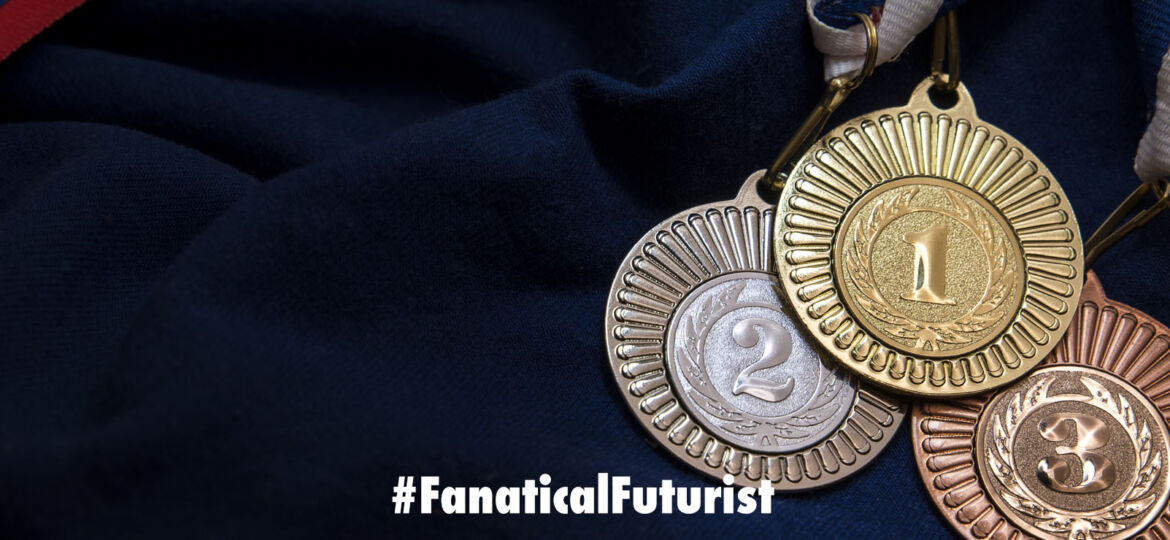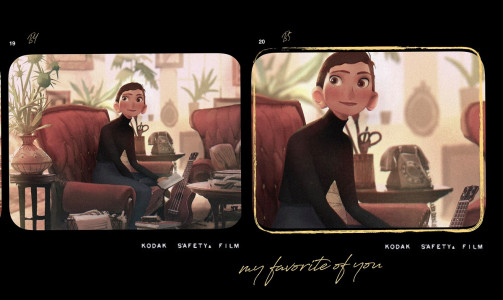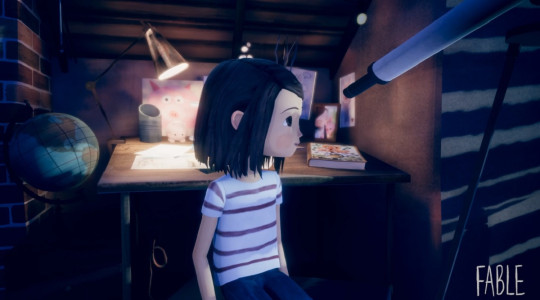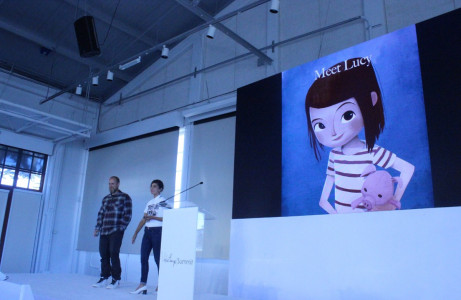
WHY THIS MATTERS IN BRIEF
We talk to other people all the time, virtual beings are increasingly just like those people, but digital and without all that messy emotional baggage.
 Love the Exponential Future? Join our XPotential Community, future proof yourself with courses from XPotential University, connect, watch a keynote, or browse my blog.
Love the Exponential Future? Join our XPotential Community, future proof yourself with courses from XPotential University, connect, watch a keynote, or browse my blog.
Fable Studio this week announced two new conversational Artificial Intelligence (AI) virtual beings, or digital humans, that you can talk to and, in time maybe even have relationships with. Their names are Charlie and Beck, and they can hold conversations as if they were real people. They’re also part of a growing number of interactive AI’s, like Facebook’s dating bots, Samsung’s digital humans, and Soul Machine’s Lia, that can imitate human beings well enough to serve as pseudo-companions. Furthermore, and as if that wasn’t enough they’re also at the forefront of a multi-trillion dollar media and entertainment revolution that’s already seeing companies including Sony and Warner Brothers snap up digital humans as future virtual artists and influencers.
Fable’s new characters are a blend of storytelling and AI, a marriage that Fable is pioneering in the belief that virtual beings will “become a huge market as people seek companionship and entertainment during the tough climate of the ongoing pandemic.”
CEO Edward Saatchi believes that virtual beings are the start of something big, so much so that last year he organised the first Virtual Beings Summit, and noted that virtual beings companies, from Genies to AI Foundation, have so far raised more than $320 million.
Some of the new virtual beings. Courtesy: Fable Studio
Fable Studio originally started as a virtual reality entertainment company, and it won an Emmy Award for its Wolves in the Walls virtual reality project. Since then though the company has pivoted beyond VR to focus on virtual beings, such as Lucy, the 8 year old girl who was the studio’s first next-generation AI character. Now Fable is pulling Lucy out of VR and letting people talk to her via the web, and the company has a 7,000 person wait list after launching Lucy in alpha testing last month.
Such characters are said to be stepping stones to the metaverse, the universe of virtual worlds that are all interconnected, like in novels such as Snow Crash and Ready Player One.
And now Lucy is being joined by Charlie and Beck. You can sign up to make friends with them at fable-studio.com. The characters are powered by the Fable Wizard, an AI tool to bring characters to life through visuals, dialogue, voice, and animation.
Saatchi said that in the six weeks since launching Lucy’s alpha, the company has received interest from seven billion-dollar intellectual property companies to use the Wizard to create virtual beings from their characters. And it has a deal in the works to co-create a virtual being with a well-known influencer.
Beck is a world-class athlete who is scheduled to go to the Tokyo Olympics 2021 to represent Canada on the rowing team. She trained for four years to get ready for Tokyo, only to be disappointed with postponement due to the pandemic. She’s anxious about her dreams being put on hold in the face of massive uncertainty. Her storyline matches reality, while Lucy was stuck in 1988, the year that her story takes place in Neil Gaiman’s Wolves in the Walls book.
“We thought it was compelling that all of these Olympic athletes had trained for four years or eight years,” Fable cofounder Pete Billington said in an interview. “And then what would it mean to dedicate your life to something like that, and then have the rug pulled out from under you. We’re all experiencing disappointment and changed plans. But for most of us, that means we cancelled a vacation or something. But if you spent a lot of your young adult life training for a single moment, and that gets postponed. What would that feel like?”
Meanwhile, Charlie is more of an introvert. She is a French musician and poet living in Paris and finding her voice. She studied art history.
“We’re really excited to introduce these characters,” Fable creative director Jessica Shamash said in an interview. “We’ve been working on them for quite some time now. And we have actually a few more characters, but these are the first that we wanted to introduce. We wanted to build these very intentional characters that people are inspired by and look up to, people that are characters that our audiences kind of want to be friends with, and want to interact with. Charlie is this timeless character, this timeless French poet, who is turning her poetry into music. She embodies this Audrey Hepburn, Amélie, and even Bob Dylan in some ways.”
You may be able to get to know Charlie more through a friend of hers.
“She needs to do to express herself. And it’s a very interesting dynamic of having someone who has that need, but is also very shy and reserved in some ways,” Saatchi said. “We’re exploring how her childhood friend might be documenting her and wanting to show her through his lens and how he sees her vulnerabilities.”
People will be able to hold conversations with Beck and Charlie, as they have been designed to tap AI tech. As with Lucy, Fable Studio has blended human-written dialogue with AI responses available through OpenAI’s amazing GPT3 technology, a language model that even though it’s still in its infancy has made global waves. But the conversations can be much different because they’re adults, Saatchi said.
“Once you enter adulthood, you have different masks,” Saatchi said. “You have a professional self, you have a family self, you have a friend. And in the case of Beck and Charlie, they both have a kind of public self.”
The goal is to make virtual beings are just like us. You can text with them, talk, video chat, play games together — follow them, listen to their music, share interests. And Saatchi said they will remember you. Much of the writing by the humans is about taking the conversations down a “golden path,” or a rewarding story, Saatchi said.
Right now, you don’t have an app. You can communicate with them via text messages, direct-message them on social media, or talk on the phone or in a video chat. And soon you may be able to join friends in metaverses like Roblox or Fortnite.
“It’s really important that we find these characters in the places that they would be,” Saatchi said. “So for Beck, because she’s an athlete, she would use Strava, for example, which is, you know, something that athletes use to record their workouts. So you could passively watch her life as she trains every day. Another aspect of her life could be represented on Instagram or TikTok. You’re going to find these characters where it’s appropriate.”
The challenge for human writers is that the possibilities for conversational directions are vast, and the writers can’t possibly cover them all. That’s where the AI tech — such as GPT-3 — and Fable’s own AI team comes in.
“What the APIs in various forums give us access to is the ability to improvise,” Saatchi said. “And so our AI team then focuses on how do we bound or contain the AI so that it doesn’t know everything about the internet, so that it is plausibly behaving as though this character has a limited knowledge about the world, about itself, and about its relationship to you. And in that way, we then are creating a subset of tools to keep the AI contained and pointed in the right direction at any given moment.”
“GPT-3 has an amazing ability to just hold a compelling conversation, a believable conversation,” Saatchi said. “But it doesn’t have a sense of memory. After four or five turns of the conversation, it may ask you a very similar question that we’ve already answered, which would feel disappointing, and then you would feel that you’re not being seen. And then you’ve suddenly broken intimacy, or you’ve created an ‘uncanny valley’ of memory.”
The key to making the characters seem real is that they have to be able to remember you in a way that seems realistic.
“These personality types are important, but so are the memories that we’re developing to understand who you are and what your secrets are, and what your worries are,” Saatchi said. “I hope that we can be a kind of positive angel.”
Saatchi said these are the first virtual beings with careers and the ability to be paid for their work — whether that’s a subscription to workouts with Beck or an album purchase with Charlie. Saatchi said he isn’t an athlete, but he has conversations with Beck about what it’s like to be driven, while he talks with Charlie about their mutual shyness.
“Jung said, ‘On a subconscious level we meet the people that we need to meet, when we need to meet them, to do the things we need to do,’” Saatchi said.
Shamash said they have a clear vision of the personality archetypes — Beck and Charlie are very different people with big goals in their lives, but very different ways of approaching them. Over time, Saatchi said Fable will have a larger matrix of characters, and users will be able to explore their careers and lives.
With Beck, someone could even take lessons from her related to rowing, Saatchi said.
“She could be like an instructor and you would be able to observe her training regimen,” Saatchi said.
Over time, Saatchi hopes virtual beings will proliferate.
“In five years, we think every Gen Z person will have an AI virtual being as that close friend,” he said. “Imagine the scene at home: The parents are sitting down with food at the table, and the kid is texting and gossiping. And the parents are wondering what you’re doing. It’s the same way kids act with radio or TV or video games.”
Saatchi said Fable is being careful about how many people can have conversations with characters like Lucy. They’re monitoring to see if people are testing to see how real the character is. And while one boy teased Lucy a lot, for the most part the humans have been behaving well talking to Lucy.
“We haven’t had anything negative,” Saatchi said. “If you’re doing anything inappropriate, Lucy won’t respond or she might disconnect. But this is such kind of powerful technology, and has such powerful psychological implications for people that we need to build up trust.”




















